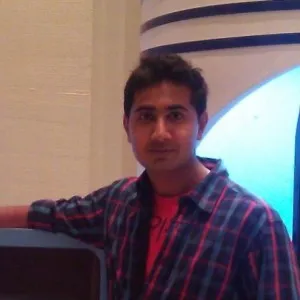[Techie Tuesdays] Sunil Urs - building software that will pay to make more software
I was recently writing about Canvas.js, a HTML5 based data visualization library, and its founder, Sunil Urs gave me an answer that I hadn’t heard enough about. I asked him the typical ‘Are you going to raise funds?' question and he said, “Not really. People are paying for the product, and in a few months it will be self sustainable. Then I’ll work on something else.”

Now that’s a first. While the approach to building a large company and scaling rapidly is a great thing, here was a guy, whose focus was to build a company around a product so good, that people wouldn’t mind paying for it since day one. And when I came to know that he built the product as well, I knew I got another Techie Tuesday.Sunil Urs is the founder of Fenopix, a Bangalore-based software services startup, and is popularly known for its recently launched Canvas.js. I spoke to the man behind the product, and found out that he was also one of the first engineers who worked on popular mobile news reader Pulse, which recently got acquired by LinkedIn.
We give you, Sunil - a quintessential techie, with simple goals.
“Like magic..”
Sunil’s first interaction with computers came when he was at school. He says, “My parents brought home a computer for my brother, as he needed it for his project. When he was not using it, I was to play around with it. Back then, there was not much access to the internet as it was very expensive, and I used to get my hands on all those Chip and Digit magazines, and install software from the CDs that came with them. It wasn’t much and my brother used to always scold me because the computer was down every other day, because of all the crackware I was installing.”
Of course, as time went by, the intention of building software of his own was bound to creep in, and the opportunity presented himself. He says, “My friend had taken on a project that involved a lot of manual work and he was spending way too much time on it. I knew a bit of C and used to build small applications. He asked me for some help. So I spent two days building a computer software, which would automate his process. And when it was ready, it finished what he was doing in a few seconds.”
Like magic, he said. But even now, he wasn’t quite sure if he wanted to pursue computer science as a profession. In fact, he studied electronics engineering at college, but he knew that he could learn programming on his own.
A failed startup attempt and success
In his third year of college, Sunil tried working on a startup of his own, which failed quite badly. He says, “That was never really a proper attempt at a startup, but I knew that I had to work at a startup for a bit to understand how it should really be run.” And so he did. He worked at a startup called WebYog for a few years and saved up some money which would allow him to startup on his own. In the meanwhile, he built small mobile applications. He says, “Mobile was just coming up at that time and I built some education apps like GREbuddy. It was at one time one of the best rated apps on the reference section on Android store. It gave be a lot of confidence.”
Sunil was also a big fan of the popular news reader app, Pulse, which at the time, wasn’t available for Windows Phone. He says, “I built one for Windows and it became popular. In fact, the people from Alphonso Labs, the makers of Pulse called me and asked if I could work with them. And so I did.” He was a part of the first 12 people that made the app.
He left a year back and I asked him if he regrets having done that, as he could have been a part of LinkedIn now. He said, “Not really. Firstly I was working remotely from India and secondly, I was working on a data visualization library which I was very excited by.”
Be practical and build useful things

Sunil shared that he spent a year building Canvas.js. He says, “I really wanted to put out a top class product and charge for it since day one. And people are happy to do that, which I think is great. I want to build a software that pays for me, and helps me build more software. Back then, there weren’t many HTML 5 data visualization tools and I wanted to build a quality product. Today, Canvas.js pays for its expenses and I hope it does more of that in the coming months.”Sunil also was once enticed by the thought of owning a big company and having millions of users. But now his priorities have changed. He says, “So many companies shut down, despite having the userbase and the funding. It’s about building a product that is useful. This will make the product profitable and you can build a company around it.”
On a parting note, Sunil urges students to also be practical. He says, “Everyone at college is after marks and that’s what your parents and lecturers will tell you to do as well. But when you realize that only less 10% of what you learnt is valid for life in the real world, you should start reconsidering what you want to do with your time at college. Be practical about that and build something that is of use to people.”
Get in touch with Sunil here.






![[Techie Tuesdays] Sunil Urs - building software that will pay to make more software](https://images.yourstory.com/cs/wordpress/2013/10/SunilUrs1.jpg?mode=crop&crop=faces&ar=2:1?width=3840&q=75)




